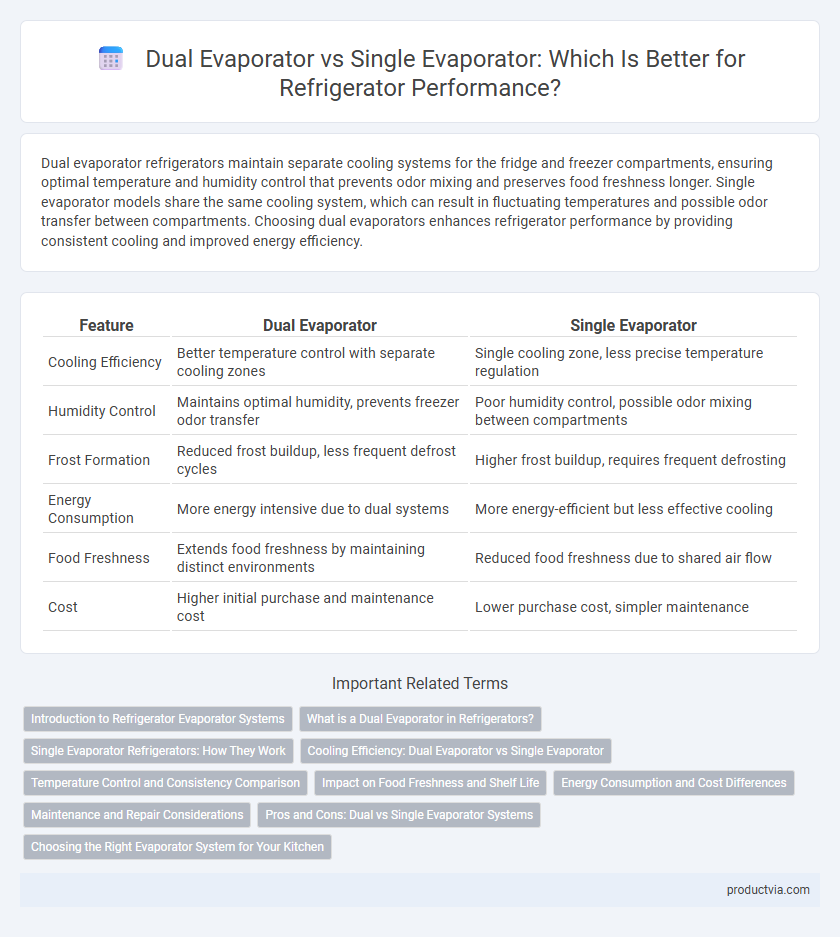Dual evaporator refrigerators maintain separate cooling systems for the fridge and freezer compartments, ensuring optimal temperature and humidity control that prevents odor mixing and preserves food freshness longer. Single evaporator models share the same cooling system, which can result in fluctuating temperatures and possible odor transfer between compartments. Choosing dual evaporators enhances refrigerator performance by providing consistent cooling and improved energy efficiency.
Table of Comparison
| Feature | Dual Evaporator | Single Evaporator |
|---|---|---|
| Cooling Efficiency | Better temperature control with separate cooling zones | Single cooling zone, less precise temperature regulation |
| Humidity Control | Maintains optimal humidity, prevents freezer odor transfer | Poor humidity control, possible odor mixing between compartments |
| Frost Formation | Reduced frost buildup, less frequent defrost cycles | Higher frost buildup, requires frequent defrosting |
| Energy Consumption | More energy intensive due to dual systems | More energy-efficient but less effective cooling |
| Food Freshness | Extends food freshness by maintaining distinct environments | Reduced food freshness due to shared air flow |
| Cost | Higher initial purchase and maintenance cost | Lower purchase cost, simpler maintenance |
Introduction to Refrigerator Evaporator Systems
Refrigerator evaporator systems regulate cooling by managing airflow and humidity inside the unit. Dual evaporator systems use two separate evaporators to independently control the refrigerator and freezer compartments, enhancing temperature precision and reducing odor transfer. Single evaporator systems rely on one unit to cool both compartments, which can lead to less effective humidity control and potential flavor contamination.
What is a Dual Evaporator in Refrigerators?
A dual evaporator in refrigerators consists of two separate evaporators that independently manage the cooling of the fridge and freezer compartments, optimizing temperature control and humidity levels. This system enhances food preservation by preventing odors from mixing between compartments and maintaining ideal moisture, reducing freezer burn and wilting. Dual evaporators improve overall energy efficiency and temperature stability compared to single evaporator models, which rely on a single cooling source for both compartments.
Single Evaporator Refrigerators: How They Work
Single evaporator refrigerators use one cooling coil to regulate temperature and humidity across both the fridge and freezer compartments, often leading to shared air circulation between them. This design can cause odor transfer and uneven cooling, with the freezer potentially impacting the moisture levels in the refrigerator section. Single evaporator systems are typically more affordable but may offer less precise temperature control compared to dual evaporator models.
Cooling Efficiency: Dual Evaporator vs Single Evaporator
Dual evaporator refrigerators enhance cooling efficiency by independently controlling humidity and temperature in the fresh food and freezer compartments, preventing odor transfer and maintaining optimal preservation conditions. Single evaporator models rely on a single cooling system for both compartments, which can lead to less precise temperature management and increased moisture mixing. This results in dual evaporator systems providing better overall temperature stability and food freshness compared to single evaporator refrigerators.
Temperature Control and Consistency Comparison
Dual evaporator refrigerators provide superior temperature control and consistency by maintaining separate cooling zones for the fridge and freezer compartments, preventing odor transfer and moisture imbalance. Single evaporator models use a shared cooling system, leading to potential temperature fluctuations and less precise humidity regulation between compartments. This design difference results in dual evaporators offering enhanced food preservation and energy efficiency compared to single evaporators.
Impact on Food Freshness and Shelf Life
Dual evaporator refrigerators maintain separate cooling zones for the fridge and freezer, preventing odor transfer and providing precise humidity control that significantly extends food freshness and shelf life. In contrast, single evaporator models share the same cooling system, which can cause temperature fluctuations and moisture imbalance, leading to faster food spoilage. The advanced airflow management in dual evaporator systems preserves optimal conditions for perishable items, making them superior in maintaining high food quality over time.
Energy Consumption and Cost Differences
Dual evaporator refrigerators typically offer better temperature and humidity control by separately cooling the fridge and freezer compartments, resulting in improved food preservation and reduced energy consumption. Single evaporator models are generally more affordable upfront but may consume more energy due to less efficient moisture and temperature regulation. Energy savings with dual evaporators can offset higher initial costs over time, making them a cost-effective choice for long-term use.
Maintenance and Repair Considerations
Dual evaporator refrigerators reduce the risk of cross-contamination between fridge and freezer compartments, simplifying targeted maintenance and minimizing odor issues. Single evaporator models often require servicing of a shared system, which may lead to longer repair times and potential impact on both compartments during fixes. Repair costs for dual evaporator systems can be higher due to additional components but result in more precise troubleshooting and potentially lower long-term maintenance.
Pros and Cons: Dual vs Single Evaporator Systems
Dual evaporator systems in refrigerators offer superior temperature control and humidity management by independently circulating air in the fridge and freezer compartments, reducing odor transfer and preserving food freshness longer. Single evaporator models typically have lower upfront costs and simpler maintenance but may struggle with consistent temperature distribution and increased moisture buildup, which can lead to quicker spoilage. Choosing between the two systems depends on prioritizing energy efficiency and food preservation quality versus budget-friendly pricing and straightforward repair needs.
Choosing the Right Evaporator System for Your Kitchen
Dual evaporator systems enhance refrigerator performance by independently controlling humidity and temperature in the fridge and freezer compartments, preventing odor transfer and preserving food freshness longer. Single evaporator refrigerators use one cooling system for both compartments, which can lead to moisture imbalance and quicker spoilage in sensitive items. Selecting a dual evaporator model is ideal for kitchens requiring precise climate control and optimal food preservation, especially for diverse storage needs.
Dual Evaporator vs Single Evaporator for Refrigerator Performance Infographic

 productvia.com
productvia.com